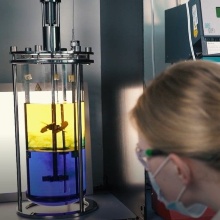Immunoglobulins are antibodies that are generated by the immune system in answer to the sudden emergence of macromolecules. For example, these might be on the cell surface of bacteria that have infiltrated the body, or they are found in abnormal somatic cells. These play an important role in the identification and suppression of infections, such as Hepatitis A/B or Rabies, and in controlling cancer cells. But they are also markers in rapid COVID tests. There is a huge demand for such therapeutic antibodies. Under the direction of Prof. Ralf Takors and the Hamburg University of Technology (TUHH), researchers at the University of Stuttgart are currently using the immunoglobulin lgG1 to increase production using scale-up techniques.
Today, biopharmaceuticals, i.e., medicines, antibiotics and vaccines obtained using biotechnology, are usually produced at an industrial scale in large bioreactors. In addition to microorganisms, sensitive mammalian cells from human or animal tissues are used for particularly complex products, such as antibodies. Inside the bioreactor, these sensitive cells must be supplied with nutrients and oxygen, so that they have the prefect environment for more effective production. This is easier to accomplish in small laboratory reactors than it is large, industrial bioreactors. To improve the cultivating conditions in large production reactors, laboratory reactors must accurately replicate the conditions in large bioreactors, so that the processes conducted in the laboratory can then be precisely replicated at an industrial scale.
A customized scale-up to industrial production
What works well on a small scale can only be replicated at an industrial scale by implementing a customized scale-up of the laboratory conditions. This is where the research von CHOLife (Experimental Multi-Scale Analysis and Simulation of Lifelines in a Bioreactor) comes into play, examining the scale-up process using the immunoglobulin IgG1. Validation and simulation are carried out by Prof. Michael Schlüter’s team at the TUHH’s Institute of Multiphase Flows, enabling the close examination of the mixing of substance components using three-dimensional flow fields and "Lifelines". Prof. Ralf Takors’ team at the University of Stuttgart’s Institute of Biochemical Engineering, examines the relevant practical parameters in the laboratory and verifies the findings of the team at the TUHH, with the help of a new experimental scale-up simulator.
New approaches for producing immunoglobulins
The project not only intends to replicate the fundamental physiological characteristics involved in scaling-up to the production of active pharmaceutical ingredients, it will also specifically explore how cells react to the complex multiphase environment of the bioreactor, progressing from a laboratory environment to a 12,000 liter bioreactor. This process is conducted using eukaryotic cells. Because these are similar to human cells, the antibodies obtained in this process are easier to use in human medicine. This is an important factor in terms of vaccine or medicine tolerance. The initial findings show that it is possible to progress from a small laboratory scale to large industrial processes (scale-up), and conversely, to go from large-volume multiphase processes in a 12,000-liter bioreactor, to a laboratory scale (scale-down). In terms of ensuring efficient and reliable strategies for the robust production of products such as immunoglobulins, the TUHH’s 4D particle tracking and the University of Stuttgart’s sensitive scale-up simulator have proved the most effective. In this joint project, it is possible to model which culture conditions the cells are exposed to in a bioreactor at an industrial scale, and how they react.
Further information about DFG SPP2170 “InterZell”
CHOLife is one of ten research projects, involving a total of 50 scientists, and financed by the German Research Foundation (DFG), as part of the InterZell (SPP 2170) program. The aim is to investigate and adapt the model parameters in a bioreactor in order to increase the sustainable production of active pharmaceutical ingredients. What makes “InterZell” special, is the interdisciplinary cooperation between various research facilities. “The synergy between engineering sciences and life science is, in my opinion, what make the program so successful”, emphasizes coordinator Prof. Ralf Takors from the University of Stuttgart.
One of the challenges faced by the program is the task of shared data management, and difficulties in this area have been amplified by the pandemic. To tackle this issue, the University of Stuttgart has offered its pilot project, the data repository “DaRUS”. In cooperation with the DaRUS team at the University Library, and under the direction of Prof. Ralf Takors, and project coordinator Dr. Martina Rehnert, a new digital data structure is being developed to sustainably store research data for the DFG program.
Expert Contact:
Prof. Dr.-Ing. Ralf Takors, Dr. Martina Rehnert, coordination SPP “InterZell”, University of Stuttgart, Institute of Biochemical Engineering, Tel. +49 711 685 69925, email Prof. Takors, email Dr. Rehnert



